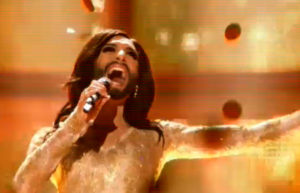
After a night of tension and close voting, Conchita Wurst representing Austria has won the Eurovision Song Contest, beating The Netherlands into second place. It is the first victory for the country since 1966.
Videos from the first dress rehearsal is available in a playlist on our YouTube channel.
The 59th contest was broadcast from the B&W Hallerna in Copenhagen. DR transformed this former shipyard building into a high tech arena capable of hosting the world’s biggest musical event. In fact, the area around the arena had been turned into a ‘Eurovision Island’ for the two weeks the contest was in town. Hosting the event were Pilou Asbæk, an actor known from f.ex. DR’s international smash hit, Borgen, and TV presenters, Nikolaj Koppel and Lise Rønne.
The set initially drew fears that they had replicated the large electric fireplace that dominated the Munich stage in 1983. However, this backdrop was a wall of technological wizardry that, as all modern sets do, interchanged easily for each act.
There was much agreement that this was the hardest contest to call in terms of a winner for many years. At least half a dozen countries went into the big night with a chance of glory.
The show began with a reminder of how we came to be in Copenhagen and the journey there from Malmo via various forms of transport. We were then introduced to all of the acts, who walked on to the stage on their way to the Green Room, which was situated in front of the stage in the auditorium.
The interval act started with some people suspended in the air at the top of ‘ladders’ (really an image on the video wall) singing a specially written version of Ode to Joy. After that, there was a video of the presenters singing a song dedicated to the number 12, the most important number in the contest. After a reprise of the songs, there was a ‘tour’ of an imaginary Eurovision Song Contest Museum. Last year’s winner, Emmelie de Forest, sang a couple of songs, her winning entry Only Teardrops and this year’s theme entry, Rainmaker, and was ably backed by all the contestants for one of them.
When the voting started, it became a four horse race between Austria, Sweden, The Netherlands and Hungary, although Armenia entered the race half way through. The disgraceful booing of the Russian girls resurfaced every time a country dared to give them some points. Soon, it became clear that there was only going to be one winner. Austria’s Conchita Wurst started to move away from the pack and secured victory with about three juries left to vote. The Netherlands finished second, ahead of Sweden in third.
The full result can be found on Eurovision.tv
The 26 competing songs:
Ukraine: Mariya Yaremchuk – Tick Tock – Kicking off the music was a country that always seems to make it to the final, and what a lively start it was! One of the curses of the modern contest is the over-elaborate stage show. Quite what they thought the man running in a giant hamster wheel would achieve is anyone’s guess!
Belarus: TEO – Cheesecake – Providing the shock of the semi-finals, Belarus made it to the big night when no-one thought the song deserved to. While the choreography was perfectly watchable, one was left with the feeling that a bit of comedy was needed to make the whole thing work.
Azerbaijan: Dilara Kazimova – Start a Fire – Dilara’s is the kind of ballad that some find classy but others find dull. Whichever side of the fence you sit on, there is no denying that her performance was worthy of a final and the presentation was, thankfully, kept relatively simple. Dilara just stood there and sang while a trapeze artist moved gracefully above her. The stage setting was a fest of red.
Iceland: Pollapönk – No Prejudice – Razors seem in very short supply in Iceland. The boys certainly had plenty of energy and they used it well so sell a song that may have been better left in Icelandic so that no-one else could understand the tired message of the song. Haven’t we all had enough of this type of song now? That said, it was really lifted by the entertainment factor of the performance. For maximum enjoyment, it’s one of those songs that is aided by use of the mute button on the remote control.
Norway: Carl Espen – Silent Storm – Carl was one of the pre-contest favourites with the bookies but seemed to slip out of contention once the rehearsals started. The storm never develops into a hurricane, although there are moments when it seems as if it’s about to. However, it left it’s mark. His performance was generally strong, but there were signs of nerves.
Romania: Paula Seling & OVI – Miracle – The history of the contest is littered with fan favourites who failed to make an impact on their second attempt. Miracle has a similar ‘in your face’ style but disappointed slightly, mainly due to the high expectations of their first venture into the contest in 2010. The prop was a circular piano which Ovi stood in the middle of. How was he supposed to know where middle C was?
Armenia: Aram MP3 – Not Alone – Going into the two weeks of rehearsals, Aram was at the top of the betting, which some found very bemusing. His ballad started slowly and went for the big finish. The performance lacked the required sincerity, not surprising considering he has made his name partly for being a comedian.
Montenegro: Sergej Ćetković – Moj Svijet – Sergej was the provider of this year’s Balkan ballad, always a welcome addition to any contest. An unwelcome addition to the presentation was the roller skater – why? That aside, Sergej himself gave a beautifully understated performance.
Poland: Donatan & Cleo – My Słowianie – We Are Slavic – To many, this was another surprise qualifier from the second semi-final. The attempt to look sexy while churning ‘butter’ failed miserably while the main vocal sounded like a mother shouting at a naughty child.
Greece: Freaky Fortune feat. RiskyKidd – Rise Up – It looked like the Greeks had found this lot walking the streets of Athens, pulled them into the offices and told them they were representing Greece this year. The hip hop style would have gone down well with teenage boys and the brass would have reminded those in former Soviet countries of funerals of presidents. The jumping up and down on the trampoline would have reminded everyone that this was modern day Eurovision.
Austria: Conchita Wurst – Rise Like a Phoenix – There is no denying that this is one of the best songs of the contest, but would it have such a large fan support if the singer wasn’t a drag act with a beard? Somehow, I doubt it. Controversies aside, this was one of the best performances of the night and Conchita resisted any temptation to camp it up anymore than it was already, playing the song in a very straightforward fashion and keeping everything simple. A very wise move that allowed the song to sell itself. The audience could be heard singing along.
Germany: Elaiza – Is it Right – The poor love is very confused! She doesn’t seem to be clear on anything, everything could be one thing or the other as far as the lyrics are concerned. Not for her mad dancers or gimmicks, just an accordion player and a lady trying hard to keep her double-bass upright.
Sweden: Sanna Nielsen – Undo – Sanna was always going to deliver one of the most accomplished performances of the night, and so it proved to be. She belted out her strong ballad and the staging was simple used the lighting to great effect, surrounding Sanna in a series of beams forming a cone shape. Justifiably one of the strong favourites, it was easy to imagine the contest returning to Sweden for the second time in three years.
France: TWIN TWIN – Moustache – If the trio’s contemporary dance track was to make any impression at all, it needed an entertaining performance. With big hair, a false moustache (quite appropriately) and lots of bounce and energy, it was certainly that! Had the voters been deciding based only on the audio, there wouldn’t have been as many points on the scoreboard.
Russia: Tolmachevy Sisters – Shine – The political situation between Russia and Ukraine plus recent legislation on issues close to the hearts of fans, led to uncertainty as to how the sisters would be received. Some, seemingly pinning the blame on two 17 year old girls, engaged in some disgraceful booing when they were announced as finalists. Their song, a mid-tempo appeal to the guy whom they have fallen for, glided along effortlessly. Whoever thought of the see-saw should be arrested by the KGB!
Italy: Emma – La Mia Città – Rock chick Emma prowled and crawled around the stage as if she owned it. For a country famed for it’s stylish fashion sense, the classical Greek style mini-dress and crown of thorns look a little strange, but there was no doubting the strength of the performance.
Slovenia: Tinkara Kovač – Round and Round – Melodic songs from the region are usually better left in their own language rather than sung in English. If this factor is ignored, the Slovenian song is still a very pleasant listen and very worthy of a place in the final. It is memorable and very hummable.
Finland: Softengine – Something Better – The young lads delivered their Coldplay meets The Killers rock song with passion and intensity. The pace of the song hides the sadness contained in the lyrics.
Spain: Ruth Lorenzo – Dancing in the Rain – UK viewers with a good memory may have recognised Ruth from her appearance on X-Factor in 2008. Dancing in the Rain wants to be a big Spanish ballad but never quite reaches the heights.
Switzerland: Sebalter – Hunter of Stars – The Swiss should be congratulated for letting Sebalter and the band play on without any cheap gimmicks. As a result, his cheerful, folksy ditty was allowed to shine. Many a foot would have been tapping around Europe during this particular three minutes.
Hungary: András Kállay-Saunders – Running – There are no smiles in this one! Running is based on the true life experiences of some of his friends. The story is a girl suffering abuse and feeling alone in the world. Sensibly, the presentation was kept simple and Andras could have done no more in his performance.
Malta: Firelight – Coming Home – The 1st World War themed video put the song in a different light. It’s Hillbilly/Bluegrass style was given a more serious angle. Live performance however, is a different matter, and all of the band smiled their way through a lively performance and got feet tapping again.
Denmark: Basim – Cliche Love Song – Some songs are best listened to just once! The home effort, described by Basim as soul mixed with R&B, becomes more annoying with each listen. It was well presented with choreography that complimented the music well. Maybe it’s another song best enjoyed with the volume down.
The Netherlands – The Common Linnets – Calm After the Storm – All calm and no storm can best describe the Dutch entry. Not highly thought of before the semi-finals, the country song suddenly found itself catapulted to very close to the top of the betting. There were no flashing lights, dancing, pyrotechnics or props, just two singers, a band and their song. Perhaps it was this contrast that made it stand out.
San Marino: Valentina Monetta – Maybe (Forse) – Having failed to reach the final with her two previous efforts, there wasn’t anyone who would have begrudged Valentina her place in the line-up. This time, she went for an expressive ballad with a touch of drama. The backdrop resembled the set for a photoshoot.
United Kingdom: Molly – Children of the Universe – The BBC are often criticised for not taking the contest seriously and being lazy with their choice of singer – not this year! Molly’s self-penned song was anthemic, rousing and among the favourites.
The song in this article is based on the writers opinion of the songs and does not necessarily express the opinion of EuroVisionary.com.
Below you find Conchita Wurst performing her 2014 winner song, Rise Like A Phoenix.
Congratulations to Conchita and to Austria.



















